(完整版)初中英语动词变名词、动词变形容词方法归纳
英语词性转换七大规则
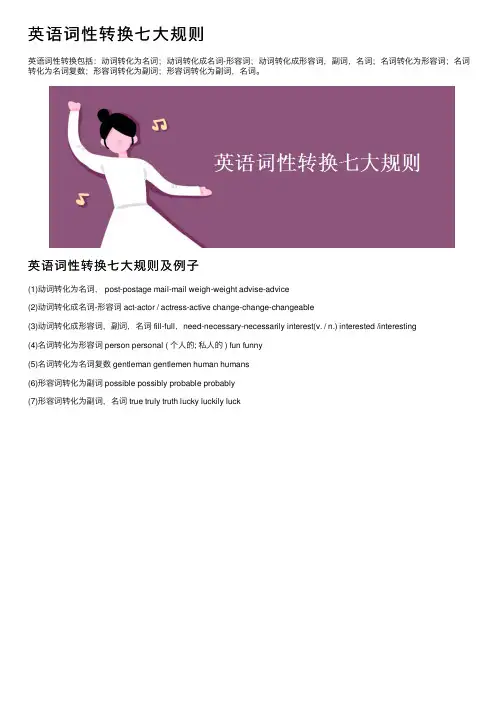
英语词性转换七⼤规则
英语词性转换包括:动词转化为名词;动词转化成名词-形容词;动词转化成形容词,副词,名词;名词转化为形容词;名词转化为名词复数;形容词转化为副词;形容词转化为副词,名词。
英语词性转换七⼤规则及例⼦
(1)动词转化为名词, post-postage mail-mail weigh-weight advise-advice
(2)动词转化成名词-形容词 act-actor / actress-active change-change-changeable
(3)动词转化成形容词,副词,名词 fill-full,need-necessary-necessarily interest(v. / n.) interested /interesting
(4)名词转化为形容词 person personal ( 个⼈的; 私⼈的 ) fun funny
(5)名词转化为名词复数 gentleman gentlemen human humans
(6)形容词转化为副词 possible possibly probable probably
(7)形容词转化为副词,名词 true truly truth lucky luckily luck。
英语形容词,名词,动词,副词 互变方法规律
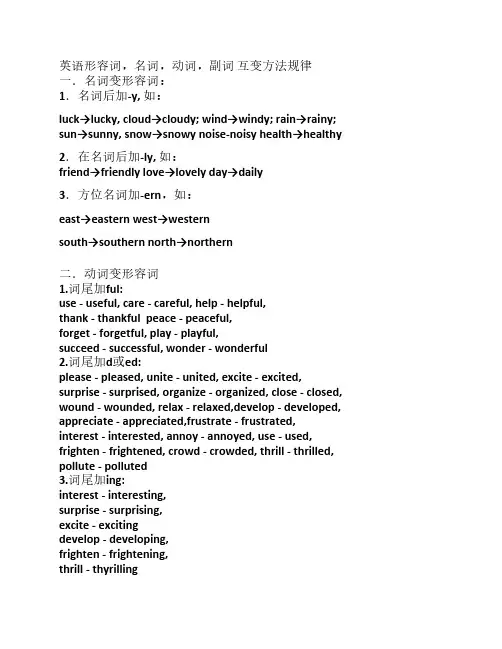
英语形容词,名词,动词,副词互变方法规律一.名词变形容词:1.名词后加-y, 如:luck→lucky, cloud→cloudy; wind→windy; rain→rainy; sun→sunny, snow→snowy noise-noisy health→healthy 2.在名词后加-ly, 如:friend→friendly love→lovely day→daily3.方位名词加-ern,如:east→eastern west→westernsouth→southern north→northern二.动词变形容词1.词尾加ful:use - useful, care - careful, help - helpful,thank - thankful peace - peaceful,forget - forgetful, play - playful,succeed - successful, wonder - wonderful2.词尾加d或ed:please - pleased, unite - united, excite - excited, surprise - surprised, organize - organized, close - closed, wound - wounded, relax - relaxed,develop - developed, appreciate - appreciated,frustrate - frustrated, interest - interested, annoy - annoyed, use - used, frighten - frightened, crowd - crowded, thrill - thrilled, pollute - polluted3.词尾加ing:interest - interesting,surprise - surprising,excite - excitingdevelop - developing,frighten - frightening,thrill - thyrillingfrustrate - frustrating,relax _ relaxing,live - livingrock - rocking,sleep - sleeping4.词尾变y为i,加ed:worry - worried, marry - married,fry - fried, terrify - terrified satisfy -satisfied5.词尾加able:know - knowledgeable, enjoy - enjoyabe,suit - suitable,adjust -adjustable, comfort - comfortable6.其它:lose - lost, fool - foolish, live - livelysleep - sleepy / sleeping / asleep,wake - awake, taste - tastyspeak - spoken, break - broken, die - dead, educate - aducational,world - worldwide三.形容词变副词规律小结例词1.大部分形容词加lycareless----carelesslyquiet----quietlydifferent----differently2.以le结尾的形容词变le为lypossible----possiblyterrible----terriblycomfortable----comfortablygentle----gentlysimple----simply3.以y结尾的形容词变y为ilyeasy----easilyangry----angrilynoisy----noisilyhappy----happilyheavy----heavilyhealthy----healthily不规则变化本身既是形容词也是副词,无需改变fast----fastearly----earlyhigh----highhard----hardlate----latefar----farwide----widealone----alone形容词和副词为完全不同的单词good----well需要去掉字母e的单词true----trulygentle----gentlyterrible----terribly虽然以ly结尾,但却是形容词,不能直接用来修饰动词friendlylivelylovelylonelyLikely有些形容词本身即为副词,同时也有加ly的副词形式。
英语词性转换归纳汇总
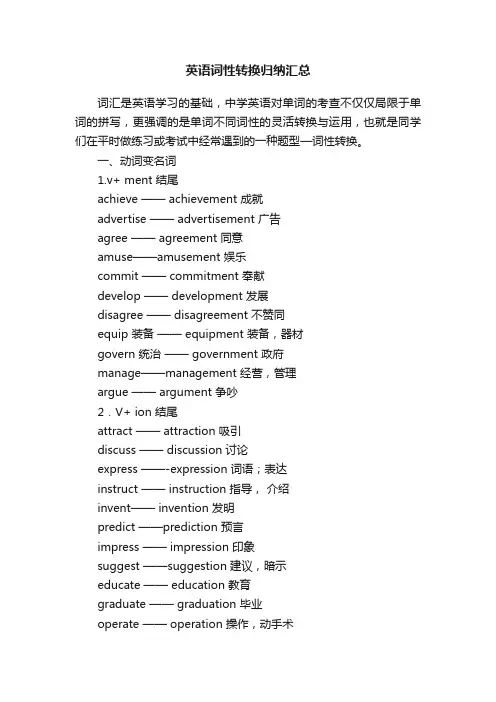
英语词性转换归纳汇总词汇是英语学习的基础,中学英语对单词的考查不仅仅局限于单词的拼写,更强调的是单词不同词性的灵活转换与运用,也就是同学们在平时做练习或考试中经常遇到的一种题型—词性转换。
一、动词变名词1.v+ ment 结尾achieve —— achievement 成就advertise —— advertisement 广告agree —— agreement 同意amuse——amusement 娱乐commit —— commitment 奉献develop —— development 发展disagree —— disagreement 不赞同equip 装备—— equipment 装备,器材govern 统治—— government 政府manage——management 经营,管理argue —— argument 争吵2.V+ ion 结尾attract —— attraction 吸引discuss —— discussion 讨论express ——-expression 词语;表达instruct —— instruction 指导,介绍invent—— invention 发明predict ——prediction 预言impress —— impression 印象suggest ——suggestion 建议,暗示educate —— education 教育graduate —— graduation 毕业operate —— operation 操作,动手术illustrate —— illustration 阐明,举例说明pollute —— pollution 污染introduce ——introduction 介绍organize ——organization组织imagine —— imagination 想象力inspire——inspiration 灵感,鼓舞人心的invite —— invitation 邀请compete —— competition 竞争,比赛pronounce ——pronunciation发音admit —— admission 承认permit —— permission 允许conclude —— conclusion 结论decide —— decision 决定describe —— description描写,描绘resolve —— resolution 决心solve ——solution 解决方法3.V+ ance 结尾allow —— allowance 允许appear —— appearance 外貌,出现perform —— performance 演出exist —— existance 存在4.V+ ing 结尾end —— ending 结尾,结局train ——training训练mean —— meaning 意义say—— saying 谚语remind —— reminding提醒bathe ——bathing沐浴5.词尾加-er或-or后变成表示“某一类人”的名词work——worker 工人teach——teacher老师sing——singer 歌手jump——jumper跳高运动员play——player表演者、运动员learn——learner 学习者visit——visitor访问者invent——inventor发明家6.V+ 其他beg——beggar 乞丐sit——seat 座位believe —— belief 信仰behave —— behavior 行为know—— knowledge 知识fly—— flight 飞行mix —— mixture 混合物press —— pressure 压力serve —— service 服务succeed ——success 成功pursue —— pursuit 追求,从事propose —— proposal 建议withdraw —— withdrawal 取钱;收回;撤退survive —— survival--survivor 幸存者arrive —— arrival到达analyze —— analysis 分析形容词变名词1.词尾ent改为ency或enceefficient有效率的——efficiency 效率patient——patience/impatience 耐性/无耐心dependent——dependence依赖性independent——independency 独立性urgent——urgency 紧急2.ble结尾,ble改为bilitypossible——possibility 可能responsible——responsibility 责任;职责3.其他accurate——accuracy 准确性 prosperous——prosperity 繁荣 true——truth 真相wide——width 宽度long——length 长度high——height 高度二、名词/动词变形容词1.名词+yhonest —— honesty 诚实的guilt 罪恶——guilty 内疚的health——healthy 健康的luck——lucky 幸运的cloud——cloudy 多云的wind—windy 多风的rain——rainy 多雨的snow——snowy 多雪的tourist —— touristy 游客多的 er结尾,改er为ryhunger——hungry 饥饿的anger —— angry 生气的 fog—— foggy 有雾的sun—— sunny 阳关灿烂的fur—— furry 毛皮的 shine——shiny 发亮的taste —— tasty 美味的2. 名词/动词+ ed 以辅音+辅音结尾的单词,直接加edtalent —— talented 有天赋的offend ——offended 生气的crowd ——crowded 拥挤的以元音字母e结尾的单词直接加dbalance —— balanced 平衡的organize——organized 有组织的pollute ——polluted 被污染的please ——pleased 高兴的元音加辅音结尾的单词,词尾辅音双写再加edspot —— spotted 有斑点的 3.名词+ ful/lesscare —— careful/ careless 小心的/ 粗心的help—— helpful / helpless 有帮助的/ 无助的use—— useful/ useless有用的/ 无用的meaning —— meaningful / meaningless有意义的/无意义的colour—— colourful /colourless多彩的/无色的pain 疼痛——painful /painless痛苦的/ 不痛的thank—— thankful / thankless 充满感激的/ 不知感恩的 peace 和平—— peaceful 和平的play游戏—— playful 爱玩耍的home —— homeless 无家可归的 4.名词/动词+ ablechange —— changeable 易变的adjust——adjustable 可调整的comfort——comfortable 舒适的knowledge——knowledgeable 知识渊博的suit ——suitable 合适的动词以辅音加y结尾把y变i 加able ,deny—— deniable 可否认的rely—— reliable 可靠的 5.名词+ ouscourage——courageous 勇敢的danger—— dangerous 危险的以y结尾,改y为i再加ousmystery神秘—— mysterious 神秘的 6.ce 变 tconfidence—— confident 自信的difference——different 不同的dependence —— dependent 依赖他人的independence—— independent 独立的 7.词尾加 aladdition—— additional 附加的,额外的music—— musical 音乐的person——personal (私人的)nation—— national 国家的education——educational有教育意义的tradition—— traditional 传统的origin起源——original 新颖的;独创的以元音字母结尾的单词,去掉词尾元音加alnature——natural 自然的globe—— global 全球的特例:class—— classical 经典的medicine 药——medical 医学的grammar—— grammatical 语法的 8.名词+ lyfriend—— friendly 友好的live——lively 活跃的,有生气的love——lovely 可爱的week——weekly 每周的man——manly 男子气概的;强壮的 9.词尾+ enwood—— wooden 木制的wool—— woolen 羊毛的 10. 表示方位的词East——easternWest——westernSouth——southernNorth——northern 11.四大洲Asia 亚洲—— AsianAfrica 非洲——AfricanEurope欧洲—— EuropeanAmerica 美洲——American 12. 其他energy精力——energetic 精力充沛的strategy——strategic 战略的scientist——scientific 科学的 fool 傻子——foolish 愚蠢的love——loving 慈爱的pleasure——pleasant 令人愉快的 / pleased高兴的pride——proud 自豪的三、形容词变动词1.词尾加izemodern——modernize 使...现代化social——socialize 使...社会化2.词尾加enfast——fasten 使固定;集中于short—— shorten 缩短wide——widen 放宽less——lessen 使...减少特例(有变形):long——lengthen 使延长strong ——strengthen 加强;巩固3.词前加enlarge —— enlarge 扩大;放大四、形容词变副词1.形容词+ lybad——badly 坏地bright——brightly 明亮地casual——casually 随意地clear——clearly 清楚地complete——completely 完全correct——correctly 正确地final——finally 最后fortunate——fortunately幸运地general——generally 一般来讲loud——loudly 大声地particular ——particularly特别地polite——politely 礼貌地proper ——properly适当地main——mainly 主要地most ——mostly 多半,大多数normal——normally 正常地quick——quickly 迅速地quiet——quietly 轻轻地,安静地real——really 真正地recent ——recently 最近;近来sad——sadly 悲哀地slow——slowly 缓慢地special——specially 专门,特殊地specific——specifically 特定地,明确地strong——strongly 坚决地,强烈地sudden——suddenly突然usual——usually 通常 2. 以le 结尾的,去e + ycomfortable——comfortably 舒服地gentle——gently 温柔地possible——possibly 可能地simple——simply 仅仅;只;简单地terrible——terribly 非常;极度地 3. 辅音字母+ y 变y 为 ilyeasy——easily 容易地heavy——heavily 沉重地happy——happily 快乐地 4.特殊good——well好地true——truly 真实地。
初中英语名词、动词、形容词各形式及变化规则
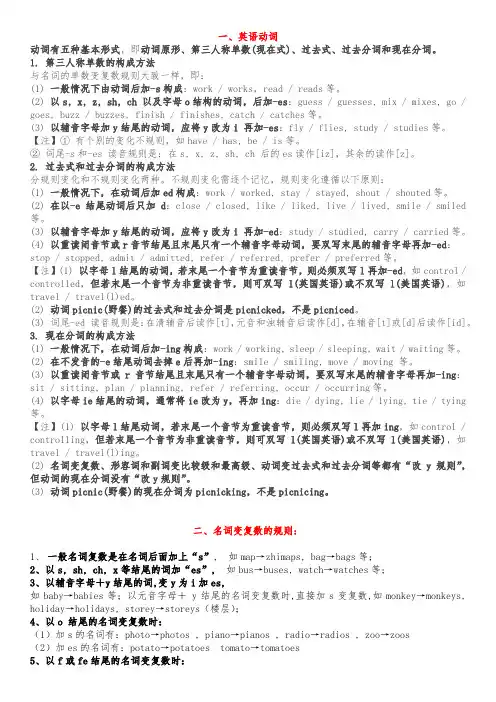
一、英语动词动词有五种基本形式,即动词原形、第三人称单数(现在式)、过去式、过去分词和现在分词。
1. 第三人称单数的构成方法与名词的单数变复数规则大致一样,即:(1) 一般情况下由动词后加-s构成:work / works,read / reads等。
(2) 以s, x, z, sh, ch 以及字母o结构的动词,后加-es:guess / guesses, mix / mixes, go / goes, buzz / buzzes, finish / finishes, catch / catches等。
(3)以辅音字母加y结尾的动词,应将y改为i 再加-es:fly / flies, study / studies等。
【注】①有个别的变化不规则,如have / has, be / is等。
②词尾-s和-es 读音规则是:在s, x, z, sh, ch 后的es读作[iz],其余的读作[z]。
2. 过去式和过去分词的构成方法分规则变化和不规则变化两种。
不规则变化需逐个记忆,规则变化遵循以下原则:(1) 一般情况下,在动词后加ed构成:work / worked, stay / stayed, shout / shouted等。
(2) 在以-e结尾动词后只加d:close / closed, like / liked, live / lived, smile / smiled 等。
(3)以辅音字母加y结尾的动词,应将y改为i 再加-ed:study / studied, carry / carried等。
(4) 以重读闭音节或r音节结尾且末尾只有一个辅音字母动词,要双写末尾的辅音字母再加-ed:stop / stopped, admit / admitted, refer / referred, prefer / preferred等。
【注】(1) 以字母l结尾的动词,若末尾一个音节为重读音节,则必须双写l再加-ed,如control / controlled,但若末尾一个音节为非重读音节,则可双写l(英国英语)或不双写l(美国英语),如travel / travel(l)ed。
初中英语名词、动词、形容词各形式及变化规则
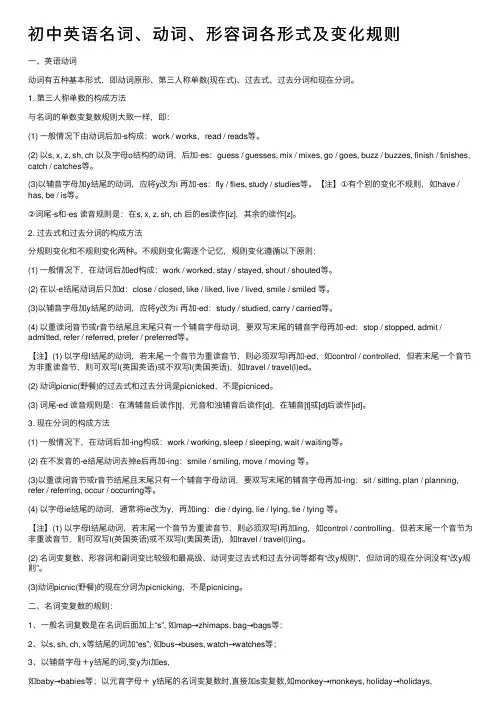
初中英语名词、动词、形容词各形式及变化规则⼀、英语动词动词有五种基本形式,即动词原形、第三⼈称单数(现在式)、过去式、过去分词和现在分词。
1. 第三⼈称单数的构成⽅法与名词的单数变复数规则⼤致⼀样,即:(1) ⼀般情况下由动词后加-s构成:work / works,read / reads等。
(2) 以s, x, z, sh, ch 以及字母o结构的动词,后加-es:guess / guesses, mix / mixes, go / goes, buzz / buzzes, finish / finishes, catch / catches等。
(3)以辅⾳字母加y结尾的动词,应将y改为i 再加-es:fly / flies, study / studies等。
【注】①有个别的变化不规则,如have / has, be / is等。
②词尾-s和-es 读⾳规则是:在s, x, z, sh, ch 后的es读作[iz],其余的读作[z]。
2. 过去式和过去分词的构成⽅法分规则变化和不规则变化两种。
不规则变化需逐个记忆,规则变化遵循以下原则:(1) ⼀般情况下,在动词后加ed构成:work / worked, stay / stayed, shout / shouted等。
(2) 在以-e结尾动词后只加d:close / closed, like / liked, live / lived, smile / smiled 等。
(3)以辅⾳字母加y结尾的动词,应将y改为i 再加-ed:study / studied, carry / carried等。
(4) 以重读闭⾳节或r⾳节结尾且末尾只有⼀个辅⾳字母动词,要双写末尾的辅⾳字母再加-ed:stop / stopped, admit / admitted, refer / referred, prefer / preferred等。
【注】(1) 以字母l结尾的动词,若末尾⼀个⾳节为重读⾳节,则必须双写l再加-ed,如control / controlled,但若末尾⼀个⾳节为⾮重读⾳节,则可双写l(英国英语)或不双写l(美国英语),如travel / travel(l)ed。
动词名词形容词副词的相互转化
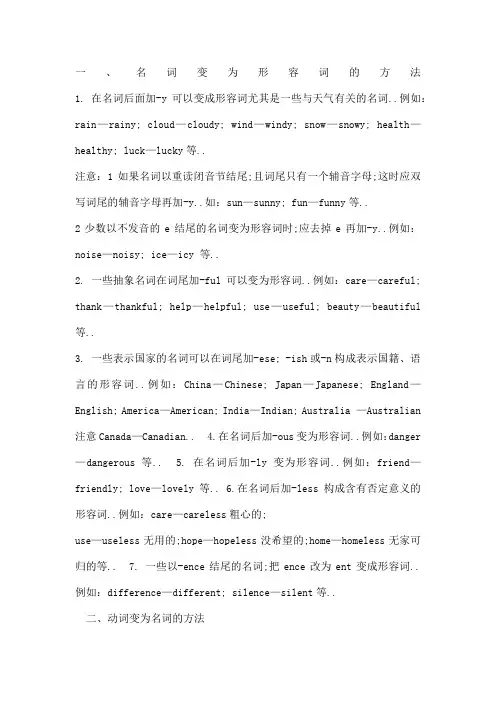
一、名词变为形容词的方法1. 在名词后面加-y可以变成形容词尤其是一些与天气有关的名词..例如:rain—rainy; cloud—cloudy; wind—windy; snow—snowy; health—healthy; luck—lucky等..注意:1如果名词以重读闭音节结尾;且词尾只有一个辅音字母;这时应双写词尾的辅音字母再加-y..如:sun—sunny; fun—funny等..2少数以不发音的e结尾的名词变为形容词时;应去掉e再加-y..例如:noise—noisy; ice—icy 等..2. 一些抽象名词在词尾加-ful可以变为形容词..例如:care—careful; thank—thankful; help—helpful; use—useful; beauty—beautiful 等..3. 一些表示国家的名词可以在词尾加-ese; -ish或-n构成表示国籍、语言的形容词..例如:China—Chinese; Japan—Japanese; England—English; America—American; India—Indian; Australia —Australian 注意Canada—Canadian..4.在名词后加-ous变为形容词..例如:danger —dangerous等..5. 在名词后加-ly变为形容词..例如:friend—friendly; love—lovely等..6.在名词后加-less构成含有否定意义的形容词..例如:care—careless粗心的;use—useless无用的;hope—hopeless没希望的;home—homeless无家可归的等.. 7. 一些以-ence结尾的名词;把ence改为ent变成形容词..例如:difference—different; silence—silent等..二、动词变为名词的方法1.词形不变;词性改变..例如:work; study; water; plant等可以用作动词;也可以用作名词..2. 一些动词在词尾加上-er或-or之后就变成了表示“某一类人”的名词..例如:work—worker; teach—teacher; sing —singer; jump—jumper; play—player; learn—learner; visit—visitor; invent—inventor等..注意:1以不发音的e结尾的动词;在词尾加-r..例如:drive—driver; write—writer等.. 2以重读闭音节结尾;且末尾只有一个辅音字母的动词;应双写末尾的辅音字母;再加-er..例如:run—runner; win—winner; begin—beginner等..3. 在动词词尾加-ing变成名词方法与动词变为现在分词的方法相同..例如: meet—meeting; build—building; wait—waiting; wash—washing; swim—swimming; shop—shopping; begin—beginning等..三、形容词变为副词的方法一般在形容词的词尾加-ly可以变成副词..例如:quick—quickly; slow —slowly; loud—loudly; sudden—suddenly 等..但是;以下几点值得注意:1. 一些以“辅音字母+y”结尾的形容词;要把y改为i再加-ly..例如:happy—happily; angry—angrily; lucky—luckily; heavy—heavily; noisy—noisily 等..2. 有些以-ble或-le结尾的形容词;去掉e加-y..例如:possible—possibly; terrible—terribly等..3. 少数以e结尾的形容词;要去掉e再加-ly..例如:true—truly等..但绝大多数以e结尾的形容词仍然直接加-ly..例如:polite—politely; wide—widely等..4. 以-l结尾的形容词变为副词时仍然要在词尾加-ly;而不是只加-y..除非是以-ll结尾的才在词尾只加-y..例如:usual—usually; careful—carefully; useful—usefully; full—fully等..四、名词转化为动词:book n 书— v 预定;seat n 座位— v 使就位;落座;water n 水— v 浇水;shoulder n 肩膀— v 负责任。
英语形容词,名词,动词,副词 互变方法规律
英语形容词,名词,动词,副词互变方法规律一.名词变形容词:1.名词后加-y,如:luck→lucky,cloud→cloudy;wind→windy;rain→rainy; sun23eastsouth1.2.please-pleased,unite-united,excite-excited,surprise-surprised,organize-organized,close-closed, wound-wounded,relax-relaxed,develop-developed, appreciate-appreciated,frustrate-frustrated,interest-interested,annoy-annoyed,use-used,frighten-frightened,crowd-crowded,thrill-thrilled, pollute-polluted3.词尾加ing:interest-interesting,surprise-surprising,4.5.know-knowledgeable,enjoy-enjoyabe,suit-suitable,adjust-adjustable,comfort-comfortable6.其它:lose-lost,fool-foolish,live-livelysleep-sleepy/sleeping/asleep,wake-awake,taste-tastyspeak-spoken,break-broken,die-dead,educate-aducatio nal,world-worldwide三.形容词变副词规律小结例词1.2.以3.以变yangry----angrilynoisy----noisilyhappy----happilyheavy----heavilyhealthy----healthily不规则变化本身既是形容词也是副词,无需改变fast----fastearly----earlyhigh----high词friendlylivelylovelylonelyLikely有些形容词本身即为副词,同时也有加ly的副词形式。
动词和形容词的相互转化方法
动词和形容词的相互转化方法动词和形容词是语言中常见的词类,它们在表达方式和句意上有着显著的差异。
然而,通过一些方法可以将动词转化为形容词,或将形容词转化为动词。
本文将介绍一些常用的方法,帮助我们在写作和表达中更加灵活自如地运用动词和形容词。
一、从动词转化为形容词1. 添加后缀 "-ing"通过在动词后面加上 "-ing" 后缀,我们可以将动词转化为形容词形式。
例如:- 原动词:interest(使感兴趣)- 形容词:interesting(有趣的)- 例句:She is always reading interesting books.2. 使用形容词化的过去分词有些动词的过去分词形式已经具备了形容词的特征,可以直接用作形容词。
例如:- 原动词:frighten(吓唬)- 形容词:frightened(受惊的)- 例句:The frightened child screamed.3. 利用名词形式将动词转化为名词形式,然后再加上形容词后缀,可以达到形容词的效果。
例如:- 原动词:relax(放松)- 名词:relaxation(放松)- 形容词:relaxing(令人放松的)- 例句:I had a relaxing massage yesterday.二、从形容词转化为动词1. 加上动词化的后缀 "-en"通过在形容词后添加 "-en" 后缀,我们可以将形容词转化为相应的动词。
例如:- 原形容词:short(短的)- 动词:shorten(缩短)- 例句:We need to shorten the meeting time.2. 使用形容词化的现在分词一些形容词的现在分词形式可以直接作为动词使用。
例如:- 原形容词:exhausted(筋疲力尽的)- 动词:exhaust(使筋疲力尽)- 例句:The long journey exhausted him.3. 利用名词转化将形容词转化为相应的名词形式,然后使用动词化的后缀,也可以将形容词转化为动词。
动词、名词、形容词、副词的相互转化
一、名词变为形容词的方法1。
在名词后面加-y可以变成形容词(尤其是一些与天气有关的名词).例如:rain—rainy, cloud —cloudy, wind—windy, snow—snowy, health—healthy, luck—lucky等。
注意:1)如果名词以重读闭音节结尾,且词尾只有一个辅音字母,这时应双写词尾的辅音字母再加—y。
如:sun—sunny, fun-funny等。
2)少数以不发音的e结尾的名词变为形容词时,应去掉e再加-y。
例如:noise-noisy, ice—icy 等.2。
一些抽象名词在词尾加-ful可以变为形容词。
例如:care—careful, thank-thankful, help—helpful, use—useful, beauty-beautiful等。
3。
一些表示国家的名词可以在词尾加—ese, -ish或-n构成表示国籍、语言的形容词。
例如:China—Chinese, Japan—Japanese, England-English, America—American, India—Indian, Australia —Australian(注意Canada—Canadian)。
4.在名词后加-ous变为形容词.例如:danger—dangerous等。
5. 在名词后加—ly变为形容词。
例如:friend—friendly, love —lovely等. 6。
在名词后加—less构成含有否定意义的形容词。
例如:care—careless(粗心的),use—useless(无用的),hope—hopeless(没希望的),home—homeless(无家可归的)等。
7。
一些以—ence结尾的名词,把ence改为ent变成形容词.例如:difference—different, silence —silent等。
二、动词变为名词的方法1。
词形不变,词性改变。
初中英语词性转换归纳汇总
初中英语词性转换归纳汇总1、动词变名词1.v+ ment 结尾achieve —— achievement 成就advertise —— advertisement 广告agree —— agreement 同意amuse——amusement 娱乐commit ——commitment 奉献develop —— development 发展disagree —— disagreement 不赞同equip 装备——equipment 装备,器材govern 统治——government 政府manage——management 经营,管理argue ——argument 争吵2.V+ ion 结尾attract ——attraction 吸引discuss —— discussion 讨论express ——-expression 词语;表达instruct ——instruction 指导,介绍invent——invention 发明predict ——prediction 预言impress —— impression 印象suggest ——suggestion 建议,暗示educate —— education 教育graduate ——graduation 毕业operate ——operation 操作,动手术illustrate —— illustration 阐明,举例说明pollute —— pollution 污染introduce ——introduction 介绍organize ——organization组织imagine —— imagination 想象力inspire——inspiration 灵感,鼓舞人心的invite —— invitation 邀请compete —— competition 竞争,比赛pronounce ——pronunciation发音admit ——admission 承认permit —— permission 允许conclude —— conclusion 结论decide —— decision 决定describe —— description描写,描绘resolve —— resolution 决心solve ——solution 解决方法3.V+ ance 结尾allow —— allowance 允许appear —— appearance 外貌,出现perform —— performance 演出exist —— existance 存在4.V+ ing 结尾end —— ending 结尾,结局train ——training训练mean —— meaning 意义say—— saying 谚语remind —— reminding提醒bathe ——bathing沐浴5.词尾加-er或-or后变成表示“某一类人”的名词work——worker 工人teach——teacher老师sing——singer 歌手jump——jumper跳高运动员play——player表演者、运动员learn——learner 学习者visit——visitor访问者invent——inventor发明家6.V+ 其他beg——beggar 乞丐sit——seat 座位believe —— belief 信仰behave —— behavior 行为know—— knowledge 知识fly—— flight 飞行mix —— mixture 混合物press —— pressure 压力serve —— service 服务succeed ——success 成功pursue —— pursuit 追求,从事propose —— proposal 建议withdraw —— withdrawal 取钱;收回;撤退survive —— survival--survivor 幸存者arrive —— arrival到达analyze —— analysis 分析2形容词变名词1.词尾ent改为ency或enceefficient有效率的——efficiency 效率patient——patience/impatience 耐性/无耐心dependent——dependence依赖性independent——independency 独立性urgent——urgency 紧急2.ble结尾,ble改为bility possible——possibility 可能responsible——responsibility 责任;职责3.其他accurate——accuracy 准确性prosperous——prosperity 繁荣true——truth 真相wide——width 宽度long——length 长度high——height 高度名词/动词变形容词1.名词+yhonest —— honesty 诚实的guilt 罪恶——guilty 内疚的health——healthy 健康的luck——lucky 幸运的cloud——cloudy 多云的wind—windy 多风的rain——rainy 多雨的snow——snowy 多雪的tourist —— touristy 游客多的er结尾,改er为ryhunger——hungry 饥饿的anger —— angry 生气的fog—— foggy 有雾的sun—— sunny 阳关灿烂的fur—— furry 毛皮的shine——shiny 发亮的taste —— tasty 美味的2. 名词/动词+ ed以辅音+辅音结尾的单词,直接加edtalent —— talented 有天赋的offend ——offended 生气的crowd ——crowded 拥挤的以元音字母e结尾的单词直接加dbalance —— balanced 平衡的organize——organized 有组织的pollute ——polluted 被污染的please ——pleased 高兴的元音加辅音结尾的单词,词尾辅音双写再加edspot —— spotted 有斑点的3.名词+ ful/lesscare —— careful/ careless 小心的/ 粗心的help—— helpful / helpless 有帮助的/ 无助的use—— useful/ useless有用的 / 无用的meaning —— meaningful / meaningless有意义的/无意义的colour—— colourful /colourless多彩的/无色的pain 疼痛——painful /painless痛苦的/ 不痛的thank—— thankful / thankless 充满感激的/ 不知感恩的peace 和平—— peaceful 和平的play游戏—— playful 爱玩耍的home —— homeless 无家可归的4.名词/动词+ ablechange —— changeable 易变的adjust——adjustable 可调整的comfort——comfortable 舒适的knowledge——knowledgeable 知识渊博的suit ——suitable 合适的动词以辅音加y结尾把y变i 加able ,deny—— deniable 可否认的rely—— reliable 可靠的5.名词+ ouscourage——courageous 勇敢的danger—— dangerous 危险的以y结尾,改y为i再加ousmystery 神秘—— mysterious 神秘的6.ce 变 tconfidence—— confident 自信的difference——different 不同的dependence —— dependent 依赖他人的independence—— independent 独立的7.词尾加 aladdition—— additional 附加的,额外的music—— musical 音乐的person——personal (私人的)nation—— national 国家的education——educational有教育意义的tradition—— traditional 传统的origin起源——original 新颖的;独创的以元音字母结尾的单词,去掉词尾元音加al nature——natural 自然的globe—— global 全球的特例:class—— classical 经典的medicine 药——medical 医学的grammar—— grammatical 语法的8.名词+ lyfriend—— friendly 友好的live——lively 活跃的,有生气的love——lovely 可爱的week——weekly 每周的man——manly 男子气概的;强壮的9.词尾+ enwood—— wooden 木制的wool—— woolen 羊毛的10. 表示方位的词East——easternWest——western South——southern North——northern11.四大洲Asia 亚洲—— AsianAfrica 非洲——AfricanEurope欧洲—— EuropeanAmerica 美洲——American12. 其他energy精力——energetic 精力充沛的strategy——strategic 战略的scientist——scientific 科学的fool 傻子——foolish 愚蠢的love——loving 慈爱的pleasure——pleasant令人愉快的 / pleased高兴的pride——proud 自豪的3形容词变动词1.词尾加izemodern——modernize 使...现代化social——socialize 使...社会化2.词尾加enfast——fasten 使固定;集中于short—— shorten 缩短wide——widen 放宽less——lessen 使...减少特例(有变形):long——lengthen 使延长strong ——strengthen 加强;巩固3.词前加enlarge —— enlarge 扩大;放大4形容词变副词1.形容词+ lybad——badly 坏地bright——brightly 明亮地casual——casually 随意地clear——clearly 清楚地complete——completely 完全correct——correctly 正确地final——finally 最后fortunate——fortunately幸运地general——generally 一般来讲loud——loudly 大声地particular ——particularly特别地polite——politely 礼貌地proper ——properly适当地main——mainly 主要地most ——mostly 多半,大多数normal——normally 正常地quick——quickly 迅速地quiet——quietly 轻轻地,安静地real——really 真正地recent ——recently 最近;近来sad——sadly 悲哀地slow——slowly 缓慢地special——specially 专门,特殊地specific——specifically 特定地,明确地strong——strongly 坚决地,强烈地sudden——suddenly突然usual——usually 通常2. 以le 结尾的,去e + y comfortable——comfortably 舒服地gentle——gently 温柔地possible——possibly 可能地simple——simply 仅仅;只;简单地terrible——terribly 非常;极度地3. 辅音字母+ y 变y为 ily easy——easily 容易地heavy——heavily 沉重地happy——happily 快乐地4.特殊good——well好地true——truly 真实地。
- 1、下载文档前请自行甄别文档内容的完整性,平台不提供额外的编辑、内容补充、找答案等附加服务。
- 2、"仅部分预览"的文档,不可在线预览部分如存在完整性等问题,可反馈申请退款(可完整预览的文档不适用该条件!)。
- 3、如文档侵犯您的权益,请联系客服反馈,我们会尽快为您处理(人工客服工作时间:9:00-18:30)。
初中英语动词变名词、动词变形容词方法归纳
2010-12-07 15:34:23| 分类:中考英语专项| 标签:|字号大中小订阅
动词变名词小结
1.在词尾加er,r ,双写加er 或or:
A. play _ player, sing _ singer, wait _ waiter , find _ finder,
thrill _ thriller
B. write _ writer, drive _ driver, come _ comer, explore _ explorer
dance _ dancer
C. run _ runner, win _ winner, rob _ robber, traval _ travaller
D. visit _ visitor, invent _ inventor
2. 在词尾加ing:
build _ building, draw _ drawing, end _ ending, begin _ beginning, swim _ swimming,skate _ skating, feel _ feeling, say _ saying,
mean _ meaning, cross _ crossing,surf _ surfing, paint _
painting
3.在词尾加ion 或去e加ion:
A. decide _ decision, describe _ description, produce _
production,
celebrate _ celebration,pronounce _ pronunciation, decorate _
decoration
graduate _ graduation,frustrate - frustration,pollute _ pollution contribute _ contribution, congratulate _ congratulation, educate _ education,organize _ orgnization,donate _ donation, appreciate _ appreciation,operate _ operation, invite _ invitation B. discuss _ discussion, invent _ invention, attract _ attraction
impress _ impression,inject _ injection,instruct _ instruction
4.其它:
know _ knowledge, please _ pleasure, enjoy _ enjoyment, practise _ practice,die _ death, succeed _ success, weigh _
weight,
sit _ deat, change _ chance,enter _ entrance,fly _ flight,
rob _ robbery, discover _ discovery,faile _ failure,appear _
appearance,
breathe _ breath
动词变形容词小结
1.词尾加ful:
use - useful, care - careful, help - helpful,thank - thankful peace - peaceful, forget - forgetful, play - playful,
succeed - successful, wonder - wonderful
2.词尾加d或ed:
please - pleased, unite - united, excite - excited, surprise - surprised, organize - organized, close - closed,
wound - wounded, relax - relaxed,develop - developed, appreciate - appreciated,frustrate - frustrated,
interest - interested, annoy - annoyed, use - used,
frighten - frightened, crowd - crowded, thrill - thrilled,
pollute - polluted
3.词尾加ing:
interest - interesting, surprise - surprising, excite - exciting develop - developing, frighten - frightening,thrill - thyrilling
frustrate - frustrating, relax _ relaxing, live - living
rock - rocking, sleep - sleeping
4.词尾变y为i,加ed:
worry - worried, marry - married,fry - fried, terrify - terrified
satisfy - satisfied
5.词尾加able:
know - knowledgeable, enjoy - enjoyabe,suit - suitable
adjust - adjustable, comfort - comfortable
6.其它:
lose - lost, fool - foolish, live - lively / alive /living, sleep - sleepy / sleeping / asleep,wake - awake, taste - tasty speak - spoken, break - broken, die - dead, educate - aducational,
world - worldwide。
